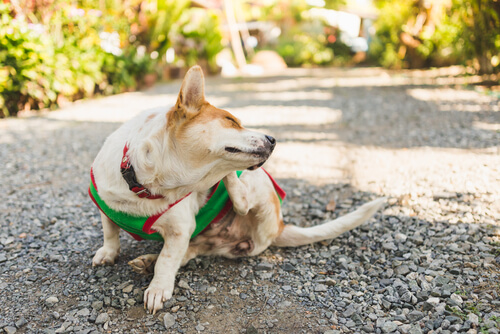Why do dogs scratch themselves?


Written and verified by the lawyer Francisco María García
It’s happened to all of us with a dog. Sometimes our pet spends a lot of time scratching his ears, his side or even the air. Logically we worry, thinking of fleas or skin problems. If this has happened to you, you’ll definitely be interested in knowing why dogs scratch themselves.
Although scratching oneself is common enough in our pets, we must never ignore it. There are many reason why your dog may be scratching himself, from the presence of some parasite to severe skin infections.
One in six visits to the vet is because the owner suspects that their pet has skin problems. One of the reasons we we must not neglect this behavior in our dogs is because their mental health is at stake.
Studies have shows that skin problems in dogs cause much discomfort in the dog. Therefore, they are considered one of the main contributors to depression in dogs.

Do you want to know why dogs scratch themselves?
- The most common reason that dogs scratch themselves is parasites: mainly fleas and ticks. These tear the skin when they suck the animal’s blood and it causes severe itching for the dog. If our pet is also allergic to the saliva of the flea, the problem will be greater and trigger allergic dermatitis.
- To know if you dog has fleas, the first thing to do is observe. Check the coat and skin thoroughly for fleas or their feces; the parasites’ favorite places are behind the ears and in the internal fold of their legs. You can also see reddish bites on the dog’s skin.
- Both fleas and ticks need to suck blood to live, and through their biting they can transmit many serious diseases to our dog. Therefore, it’s advised to bathe our dog frequently with special products to eliminate these parasites.
- Have you ever noticed that when you’re anxious you bite your nails or tap your foot incessantly? Well, a dog may manifest his anxiety by scratching a lot.
- The exercise that your pet gets is an important factor; make sure that your dog exercises enough. An excess of pent up energy, boredom and lack of attention may make him anxious and provoke him to scratch himself.
Diseases, fungi and dryness of the skin
- Scabies is a dematological problem that causes the animal to constantly scratch. Scabies mites get into your dog’s skin and cause lesions that are bothersome. The places with the least fur are most affected by the mite: the groin, armpits, elbows and edges of the ear.
- Allergies may also be the cause. They may be seasonal. They’re more common in the spring and summer, they can occur at any time of the year. Grass, seeds, flowers or pollen may be some allergens.
- Food may also cause allergies that cause scratching. Some dogs may react to certain kinds of meat, grain, cereal or even some food brands. See if the scratching occurs when there is a change in diet, because this could be the reason that your dog is scratching excessively.
- If in addition to scratching your dog presents circles without fur, the cause may fungi. To get rid of this, he’ll need treatment with products indicated by your vet.
- Dry skin may makes our dog scratch. If we notice damaged, cracked or crusted skin, it’s a sign of dryness. The weather, dehydration, some hygiene products, lack of a nutrient or hormonal problems could cause dryness. With some treatment, the problem can be overcome.

Other consequences
These are only some of the reasons that may help us figure out why our dogs are scratching themselves. The occasional scratching may not be any reason for worry, but if we notice excessive scratching we must consult a specialist.
If the dog continues scratching without receiving attention, this may cause wounds that bring infection and even more serious consequences. Therefore, we must be very attentive, as dermatological problems can seriously affect the welfare of our pet.
It’s happened to all of us with a dog. Sometimes our pet spends a lot of time scratching his ears, his side or even the air. Logically we worry, thinking of fleas or skin problems. If this has happened to you, you’ll definitely be interested in knowing why dogs scratch themselves.
Although scratching oneself is common enough in our pets, we must never ignore it. There are many reason why your dog may be scratching himself, from the presence of some parasite to severe skin infections.
One in six visits to the vet is because the owner suspects that their pet has skin problems. One of the reasons we we must not neglect this behavior in our dogs is because their mental health is at stake.
Studies have shows that skin problems in dogs cause much discomfort in the dog. Therefore, they are considered one of the main contributors to depression in dogs.

Do you want to know why dogs scratch themselves?
- The most common reason that dogs scratch themselves is parasites: mainly fleas and ticks. These tear the skin when they suck the animal’s blood and it causes severe itching for the dog. If our pet is also allergic to the saliva of the flea, the problem will be greater and trigger allergic dermatitis.
- To know if you dog has fleas, the first thing to do is observe. Check the coat and skin thoroughly for fleas or their feces; the parasites’ favorite places are behind the ears and in the internal fold of their legs. You can also see reddish bites on the dog’s skin.
- Both fleas and ticks need to suck blood to live, and through their biting they can transmit many serious diseases to our dog. Therefore, it’s advised to bathe our dog frequently with special products to eliminate these parasites.
- Have you ever noticed that when you’re anxious you bite your nails or tap your foot incessantly? Well, a dog may manifest his anxiety by scratching a lot.
- The exercise that your pet gets is an important factor; make sure that your dog exercises enough. An excess of pent up energy, boredom and lack of attention may make him anxious and provoke him to scratch himself.
Diseases, fungi and dryness of the skin
- Scabies is a dematological problem that causes the animal to constantly scratch. Scabies mites get into your dog’s skin and cause lesions that are bothersome. The places with the least fur are most affected by the mite: the groin, armpits, elbows and edges of the ear.
- Allergies may also be the cause. They may be seasonal. They’re more common in the spring and summer, they can occur at any time of the year. Grass, seeds, flowers or pollen may be some allergens.
- Food may also cause allergies that cause scratching. Some dogs may react to certain kinds of meat, grain, cereal or even some food brands. See if the scratching occurs when there is a change in diet, because this could be the reason that your dog is scratching excessively.
- If in addition to scratching your dog presents circles without fur, the cause may fungi. To get rid of this, he’ll need treatment with products indicated by your vet.
- Dry skin may makes our dog scratch. If we notice damaged, cracked or crusted skin, it’s a sign of dryness. The weather, dehydration, some hygiene products, lack of a nutrient or hormonal problems could cause dryness. With some treatment, the problem can be overcome.

Other consequences
These are only some of the reasons that may help us figure out why our dogs are scratching themselves. The occasional scratching may not be any reason for worry, but if we notice excessive scratching we must consult a specialist.
If the dog continues scratching without receiving attention, this may cause wounds that bring infection and even more serious consequences. Therefore, we must be very attentive, as dermatological problems can seriously affect the welfare of our pet.
This text is provided for informational purposes only and does not replace consultation with a professional. If in doubt, consult your specialist.








